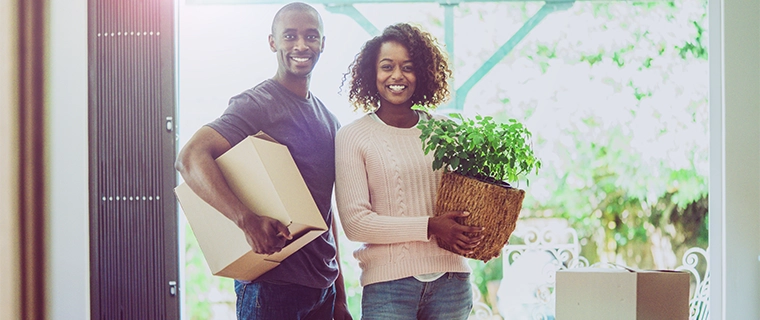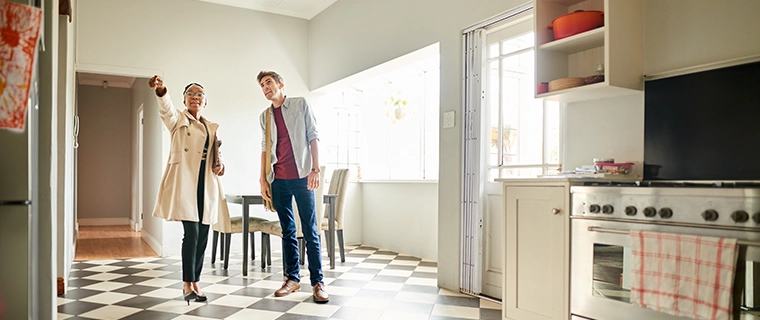Buying a home for the first time can be overwhelming if you aren’t prepared—there are dozens of factors at play, like how much you should budget or the true cost of owning a home. We know this firsthand, so we asked some of Georgia’s Own for their advice to first-time homebuyers. Below are 11 things we wish we had known before buying a home:
1. You’ll need more money than you think
“You need more money than the cost of the house (earnest money, closing costs, etc.). I didn’t think they were actually going to cash the earnest money check.”– Will M.
“There are lots of costs leading up to the purchase. Be prepared for those extra costs and fees.”– Grace H.
When purchasing a home, you’ll need more money than you think—take earnest money, inspection costs, closing costs, property taxes, and more into account. As a first-time homebuyer, some of these terms may be unfamiliar—like earnest money. Earnest money essentially informs sellers that you’re serious about the offer you’re making—the amount can vary, and you’ll usually get the money back, or it’ll go towards your home purchase.
2. Consider more than the appearance
“The most important thing about a home is not how it looks. If the size, space, and location will be right for you five or ten years down the road, the rest can be fixed.”– Laura S.
Consider more than just the home’s appearance. While curb appeal is essential—the attractiveness of a home can boost its value by 7% or more—there are other factors you should consider besides looks. If the home has the right number of bedrooms or the location drastically reduces your commute, those are elements that will make your home invaluable to you. If you’re not completely satisfied with the outside of the home, that’s okay—you can renovate later.
3. Always have availability
“Be available at all times to do whatever’s asked of you, and quickly! The process can be stressful, so be prepared.” – Eve Y.
Even though your buyer’s agent will be doing most of the legwork, you’ll need to put forth effort on your part, too—and that means always being available to do whatever is asked of you and quickly. Your agent may call because there’s urgent paperwork you need to send, or they’re trying to negotiate with the seller and need your immediate input.
4. You can add funds to your loan
“I wish I had known I could add funds to our loan for renovations. It would have been helpful to know beforehand.” – Kaye E.
If you’ve found the perfect fixer-upper and are wondering how you’ll pay for the renovations, your choices might be better than you think. Various options allow you to add the cost of a renovation to your mortgage, even if you don’t have equity. An FHA 203k Loan or a Fannie Mae HomeStyle® Renovation Mortgage is a government-sponsored renovation mortgage that allows you to finance the cost of buying a home that needs repairs and the cost of renovations, bundled into one loan.
5. Know the home’s condition
“Look in all of the cabinets and closets. Not to snoop out what they have, but to get a better idea of the condition of the home.” – Rebecca M.
While tackling the house-hunting process, it is acceptable to open closets, cabinets, pantries, and appliances (if they’re staying with the home). Looking inside cabinets and closets can indicate the home’s condition—for example, you can check kitchen cabinets to ensure they open and close properly or that there’s no mold or mildew.
6. Get a home inspection
“Get a home inspection during the due diligence time frame and request the sellers fix anything beforehand, especially anything major.” – Alex Q.
If there’s one thing you absolutely must do when purchasing a home, it’s getting a home inspection. Inspections are comprehensive reviews of a home’s condition and alert buyers to any major issues—common ones include roofing issues, electrical problems, window and door issues, foundation problems, or chimney damage. Buyers normally pay for their home inspection, but sellers who may be concerned about findings sometimes opt to pay for a pre-inspection. Never waive a home inspection—it may cost a chunk of change now, but it’ll help you save big in the long run.
7. Consider possible repairs
“Be sure to look beyond just your mortgage payment when considering whether you can afford it. Houses will need repairs.” – Kaitlyn R.
“Purchase at a lower price than your budget so you can get the repairs done your way. Don’t trust the sellers to get the repairs done completely or the way you’d have them done.” – Cassie W.
Consider purchasing a home that is priced lower than your budget to allow for repair funds. Your inspector may find that the home needs a few repairs. While this is typically a seller’s responsibility, there is a caveat—the seller may not have the repairs fully completed, or they may not take care of them the way you would. You can request a concession in an amount that is enough to cover repairs.
8. Set up bi-weekly payments
“Set up bi-weekly payments from the very beginning! It’ll help so much in the long run and is not something anyone told us.” – Kristin H.
Bi-weekly mortgages allow homeowners to make payments every two weeks rather than every month. Bi-weekly mortgage payments equal 26 half-payments per year—a total of 13 full payments. This helps reduce overall interest costs, plus an extra payment can help borrowers pay off their home loan sooner. However, there is a catch—it’s a firm commitment and cannot be changed month-to-month, so you need to determine if you can keep up with additional payments.
9. Property taxes can vary
“I wish someone had let us know how property taxes can vary greatly by county!” – Abby C.
When buying a home, there are a few external factors to consider, like property taxes. Property taxes can vary immensely by county, and it helps fund things like education, transportation, emergency services, libraries, parks, and recreation. It’s not regulated by the federal government—instead, it’s based on state and county tax levies. Depending on where you’re located, your annual property tax bill can be lower than your mortgage—in other areas, it could be three to four times your monthly mortgage. Because they’re variable and location dependent, it’s something to consider when you’re determining where to live.
10. Be prepared for emergencies
“Have an emergency fund! Our septic tank flooded not long after moving in. I wasn’t prepared for the headache or cost involved with fixing it.” – Andy C.
Unfortunately, emergencies happen. Your HVAC unit can break, your appliances can malfunction, your basement could flood, or you could encounter some plumbing issues—just to name a few. Homeowner’s insurance can help offset some costs, but not everything is covered. As a renter, it was relatively easy to handle these emergencies with a quick call to your landlord or property maintenance. But, as a homeowner, these are now your responsibility—and they can add up. Be prepared and have an emergency fund so these unexpected costs don’t drain your bank account.
11. Stay on top of routine upkeep
“With a house comes maintenance and upkeep. Budget for those extra expenses and stay on top of routine upkeep to prevent major issues down the road.” – Becky B.
As a homeowner, ongoing upkeep and maintenance are essential to preventing major issues in the future. Regular maintenance includes mowing your lawn, cleaning your siding, power washing, cleaning gutters, replacing air filters, or having appliances serviced. You should expect to spend between 1% and 4% of your home’s value each year for maintenance. For example, if your home is $300,000, you should save between $3,000 to $12,000 for annual upkeep. There are a few other factors to consider, too, like your home’s age, size, or the climate in your area.
Buying a home is one of the biggest purchases you’ll ever make, so it’s important to understand what truly accompanies homeownership. But, it doesn’t have to be overwhelming.
Ready to start your home-buying journey? Explore your options with the experts at Georgia’s Own.





